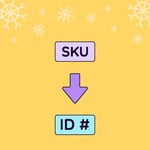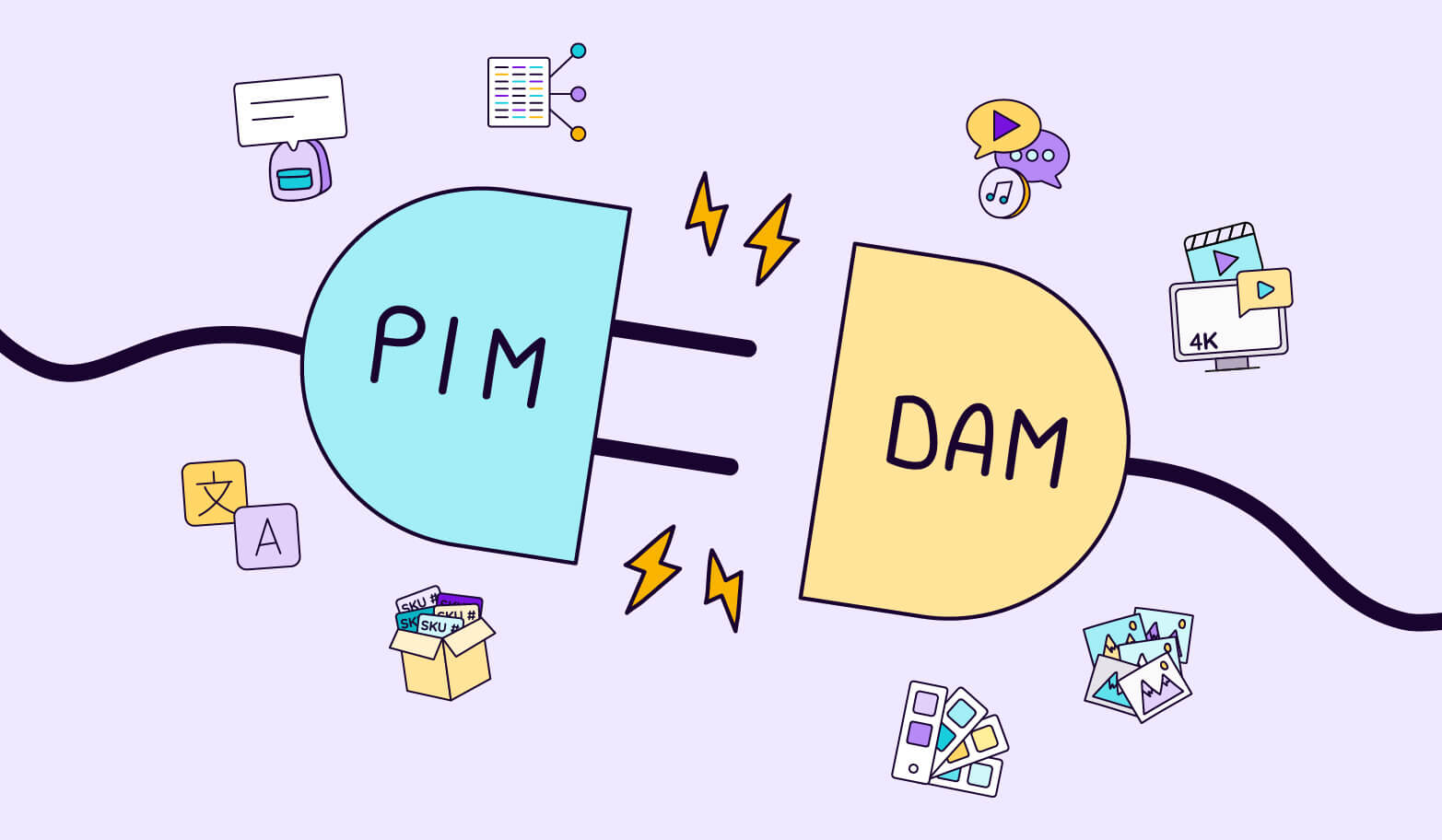The holiday season is upon us! But here at Plytix, we don’t sing about chestnuts, snowmen, or grandmothers being run down by out-of-control reindeer, no no. We sing about the key features of Product Information Management or PIM software… which is probably why we don’t get invited caroling all that often.
Still, if you’d like to be as cool as we are (and learn a little bit more about PIM), then read on for the Twelve Days of PIM-mas—bonus points if you sing along!

🎶 On the first day of PIM-mas, my software gave to me…
A central repository
First and foremost, PIM software gives you one central hub where you can store all of your product information, assets, and anything else related to your product catalog. It’s like Santa’s warehouse at the North Pole, except instead of being full of presents, it’s full of product data and multimedia, which is… better?
Anyway, life gets a lot easier when everything’s in one place—that way you can easily see what’s going on with all the different aspects of your products, and make sure everything’s in the best possible state.

🎶 On the second day of PIM-mas, my software gave to me…
Easy import feeds
…and a central repository. 🎶
Imagine a team of reindeer effortlessly pulling in sleigh-loads of product data from various sources into your PIM system—that's what easy import feeds are all about. They simplify the process of getting your product information, whether it's from suppliers or other external sources, into your PIM. This feature cuts down on manual entry, reduces errors, and basically just saves you a ton of time.

🎶 On the third day of PIM-mas, my software gave to me…
Completeness
…easy import feeds, and a central repository. 🎶
With PIM software, you'll never have to worry about incomplete product information. Completeness attributes let you see at a glance how much necessary information has been completed for each and every product listing, from specifications to pricing.
You can even use them to automatically generate lists of products that are either missing information or 100% ready too—so an automatic list of which products are naughtily incomplete and which are nicely complete, if you like.

🎶 On the fourth day of PIM-mas, my software gave to me…
Digital assets
…completeness, easy import feeds, and a central repository. 🎶
You wouldn’t put a gift under the tree without wrapping it first, and you wouldn’t list a product without including some product images and videos either (I hope!). Managing photos, videos, and other digital files gets a lot simpler with PIM software. This feature lets you organize and associate your digital assets with the right products, which means you can easily see everything at once and make sure the right images are with the right products and so on.
It's like having a massive selection of digital wrapping paper at your fingertips, making it easy to cover your product listings in attractive visuals.

🎶 On the fifth day of PIM-mas, my software gave to me…
Categories
…digital assets, completeness, easy import feeds, and a central repository. 🎶
Categorization is essential for product discovery—just think about all those potential customers frantically browsing your site on December 23rd, desperately scouring the “Gifts for Her/Him” sections and hoping the perfect present will jump out at them in the nick of time. You want to be able to have your products appear in multiple categories so that customers can see them in as many relevant contexts as possible, and you want your PIM software to be able to process those categories as a result.

🎶 On the sixth day of PIM-mas, my software gave to me…
Product relating
…categories, digital assets, completeness, easy import feeds, and a central repository. 🎶
The holidays are all about bringing people together, and this feature does the same for your products. Product relationships let you link related products together to offer customers complementary items or alternatives. It's a great way to increase visibility and sales of your entire product range, like suggesting a matching Santa hat to go with the jacket and trousers.

🎶 On the seventh day of PIM-mas, my software gave to me...
Collaborating
…product relating, categories, digital assets, completeness, easy import feeds, and a central repository. 🎶
It takes more than one reindeer to pull a sleigh (even if Rudolph does get all the credit), and it takes more than one person to get your product information into its best possible state. Luckily, PIM software is a collaborative powerhouse. It allows multiple team members to work together on product information to provide consistency and accuracy.
Features like custom user views mean each user can view the data how they like, but without affecting anyone else's setup or getting in each other's way—after all, there’s nothing worse than trying to cook a festive dinner when the kitchen’s full of people.

🎶 On the eighth day of PIM-mas, my software gave to me...
Access controlling
…collaborating, product relating, categories, digital assets, completeness, easy import feeds, and a central repository. 🎶
Keep your product information safe and sound. Access control and permission settings in PIM systems mean you can manage who has access to what information, so that only authorized personnel can make changes or view sensitive data. It's like giving different elves keys to different parts of the workshop, making sure that only the right elves work on the right toys. I mean, that’s assuming there’s some sort of division of labor going on at the North Pole—there must be, right? Surely there's some sort of system in place?

🎶 On the ninth day of PIM-mas, my software gave to me…
Data adapting
…access controlling, collaborating, product relating, categories, digital assets, completeness, easy import feeds, and a central repository. 🎶
When you’re sending gifts far and wide, you need to make sure they’re packaged correctly and have the right postage—otherwise they’ll never make it to their destination. In much the same way, PIM software adapts your data to make it match different formats and structures so it can get onto all your different platforms and channels. That way, you know your gift box full of data will end up where it needs to be, and your sales channels won’t be disappointed come Christmas morning (that’d be heart-breaking, just think of their little faces).

🎶 On the tenth day of PIM-mas, my software gave to me…
Rapid exporting
…data adapting, access controlling, collaborating, product relating, categories, digital assets, completeness, easy import feeds, and a central repository. 🎶
Having the best product data in the world isn’t going to do you any good if you can’t share it with the world, right? With rapid exporting, you can quickly send out your product information in various formats to retailers, ecommerce platforms, or other channels. Unlike certain people though, PIM software lets you do this at any time of year, not just on December 24th (just saying).

🎶 On the eleventh day of PIM-mas, my software gave to me…
Update scheduling
…rapid exporting, data adapting, access controlling, collaborating, product relating, categories, digital assets, completeness, easy import feeds, and a central repository. 🎶
On a related note, imagine if Santa Claus didn’t show up for work on the 24th—it’d be a disaster! If only he had some sort of automatic system in place that could deliver everything for him, without him having to manually take everything out himself.
This is just one of the many ways that using PIM software makes you more efficient than Father Christmas, since automated scheduled updates let you keep your product information fresh and up-to-date without constant manual intervention. This feature means you can schedule updates to your product information in advance, making sure your catalog is always current. It's like setting an alarm clock for your data, making sure it's always timely and relevant—beat that, Santa.

🎶 On the twelfth day of PIM-mas, my software gave to me…
Records and logging
…update scheduling, rapid exporting, data adapting, access controlling, collaborating, product relating, categories, digital assets, completeness, easy import feeds, and a central repository. 🎶
When the holidays are over, all we have left are the memories, and it’s a lot easier to look back if you’ve got photos or some other record of the event. Similarly, import, edit, and export logs let you track every change made to your product information with ease. This feature logs who did what and when, providing a clear audit trail, guaranteeing accountability, and helping you backtrack if needed. It’s a bit like checking social media the morning after the office holiday party, except in this case you can actually go back and correct your mistakes—if only that was possible in real life...

🎶 And on the thirteenth day of PIM-mas, Plytix gave to me…
A parting gift to enjoy
It’s a beautiful song, right? Well, as if that wasn’t enough, we’ve also got an extra present for you down below that can help you choose between the different PIM options out there. Sorry it’s not wrapped, but all the same—happy holidays, and happy selling!

Frequently Asked Questions
Product Information Management software is a tool used by businesses to manage and centralize product information. It helps in organizing, updating, and distributing product data across various sales and marketing channels. PIM software ensures that accurate and consistent product information is available to customers and stakeholders.
The key features of PIM software include data import and export capabilities, data quality and consistency checks, multichannel content syndication, digital asset management, and workflow management. These features help in efficiently managing product data, enhancing its quality, and streamlining its distribution across different platforms.
PIM software benefits a business by improving the quality and consistency of product information, reducing time-to-market for products, enhancing team collaboration, and facilitating easier updates and management of product data. This leads to improved customer satisfaction, increased sales, and better operational efficiency.
Yes, PIM software often integrates with other business systems such as ERP (Enterprise Resource Planning), CRM (Customer Relationship Management), ecommerce platforms, and marketing automation tools. This integration enables seamless data flow and consistency across various business processes.
PIM software is particularly beneficial for businesses that manage a large number of products or SKUs, operate across multiple channels, or need to provide detailed and accurate product information to customers. However, businesses of all sizes and types can leverage PIM software to improve their product information management processes.
What a ridiculous question—someone using PIM software, obviously. Happy holidays, everybody!




